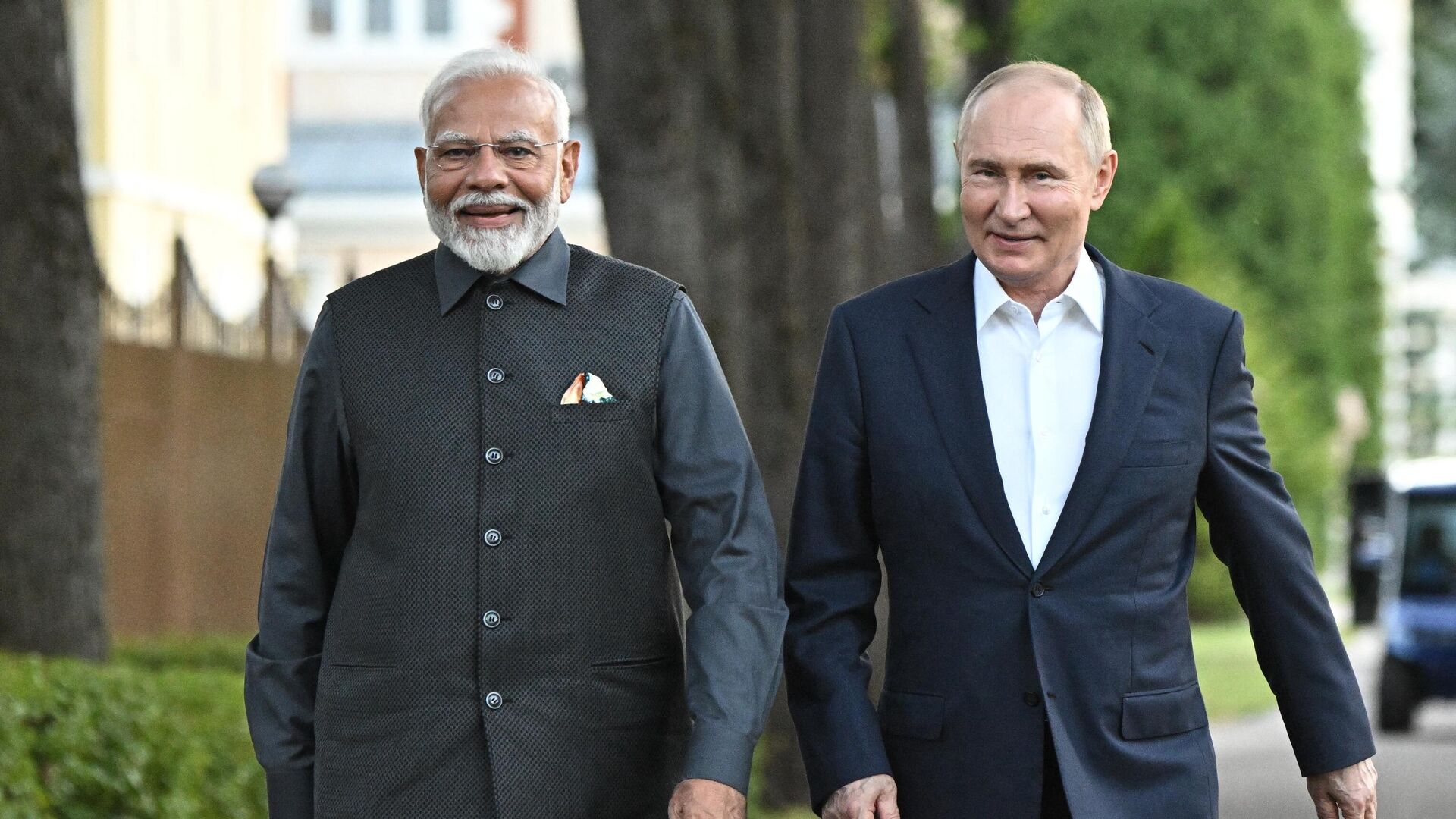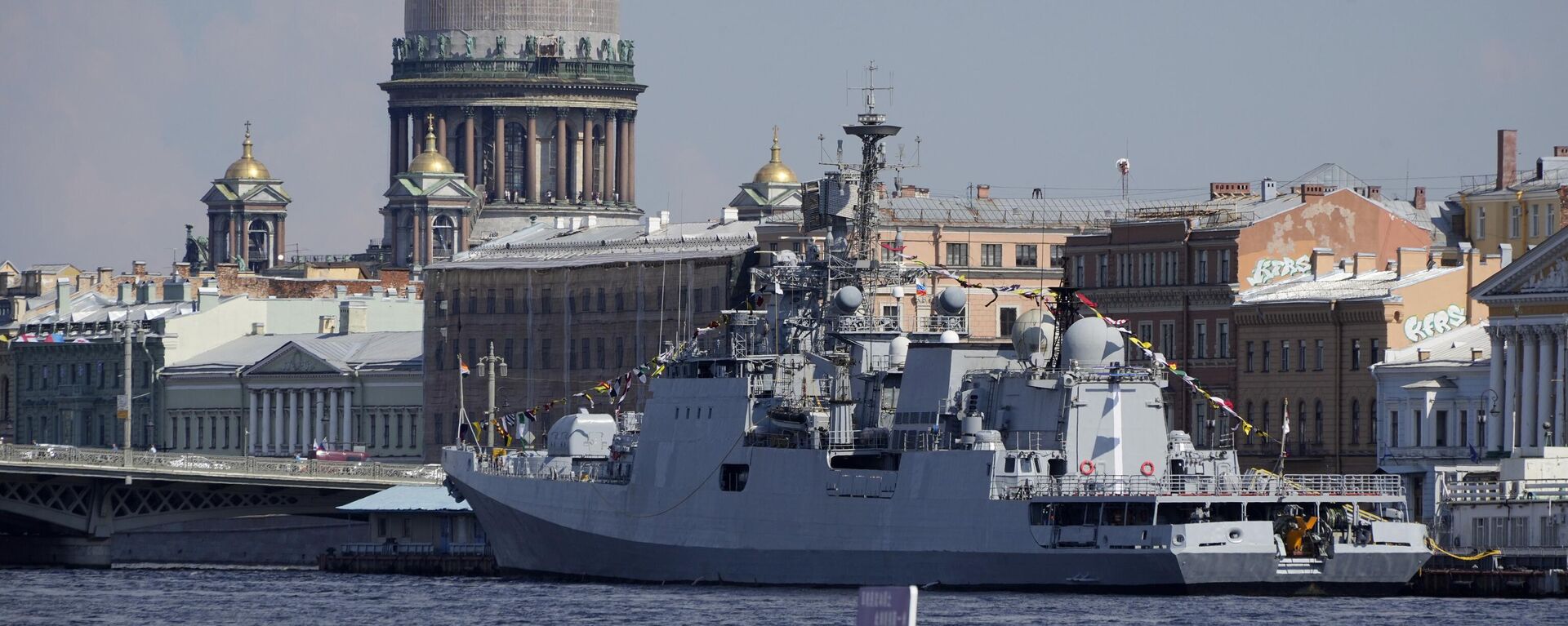https://sputniknews.in/20240807/counterbalance-strong-pitch-for-russias-engagement-in-indo-pacific-7976592.html
Counterbalance: Strong Pitch for Russia's Engagement in Indo-Pacific
Counterbalance: Strong Pitch for Russia's Engagement in Indo-Pacific
Sputnik India
Russia's involvement in the region may provide countries with additional options, allowing them to diversify their strategic choices, according to experts. 07.08.2024, Sputnik India
2024-08-07T20:49+0530
2024-08-07T20:49+0530
2024-08-07T22:16+0530
defenсe news
rohit sharma
sheikh hasina
s. jaishankar
russia
india
indo-pacific
china
south china sea
china-pakistan economic corridor (cpec)
https://cdn1.img.sputniknews.in/img/07e8/07/0a/7816869_0:0:3060:1722_1920x0_80_0_0_583da8a359466ec23f18bbd7652dcf98.jpg
Amid rising instability in South Asia following Bangladesh Prime Minister Sheikh Hasina's resignation, India faces a crucial moment in its foreign policy, with heightened regional security concerns driving a reassessment of its strategic alliances in the Indo-Pacific.Likewise, Moscow is also reconsidering its activities in the region."There is ample scope and need for Russia to enhance its engagement in the Indo-Pacific as Russia’s vision of a multipolar world will remain incomplete without a multipolar Indo-Pacific," Dr Raj Kumar Sharma, a senior research fellow at NatStrat, told Sputnik India.Sharma highlighted that India and Russia have a deep-rooted trust in their partnership, emphasizing that both countries are influential continental and maritime forces. Meanwhile, Russia’s proactive role in the Indo-Pacific would give more options to the regional countries that can diversify their strategic choices, Sharma mentioned.During his visit to Russia in July 2021, Indian External Affairs Minister S. Jaishankar stressed that "India wanted a more active presence and participation of Russia in the Indo-Pacific, something which is contrary to the aim of the declassified Indo-Pacific strategy of the US," the expert added.However, Sharma contends that while the strategic landscape in the Indo-Pacific appears to be "a binary choice between the US and China", this perspective does not accurately reflect the geographical realities of the region.Sharma noted that Russia's involvement in the Indo-Pacific would act as a counterbalance to the United States; as both nations represent distinct powers with differing ideologies and perspectives, therefore Russia's role in creating a multipolar Indo-Pacific that avoids domination by any one power, whether the US or China, is crucial.Likewise, Sharma mentioned, political scientist "Sergey Karaganov had argued in 2016 that under the GEP, Russia aimed to establish itself as a central geoeconomics and geopolitical force in Eurasia".On the other hand, Russia's significant resources and historical precedents, coupled with its long-standing strategic partnership with India, position it as a key player in balancing the Indo-Pacific region, Commodore (Retd) RS Vasan, director general of the Chennai Centre of China Studies, told Sputnik India.Arctic Expertise as Crucial for Maritime Trade and ConnectivityA similar counterbalance could be sought in the Arctic region, the experts indicated.India, which values maritime trade and connectivity, "sees Russia's role in Arctic connectivity as essential due to the route's growing importance for trade and resource extraction, making Russia’s extensive Arctic expertise and infrastructure crucial," Vasan illustrated.While Japan, alongside the US and South Korea, is exploring a new military alliance, the commodore pointed out that "regional tensions will escalate further, despite claims that the alliance aims to promote stability and security."In that sense, incorporating Russia into the equation would be highly relevant for achieving stability, Vasan noted.Parmar emphasized that India and Russia already have a well-established bilateral relationship, marked by regular institutional exercises and reciprocal visits of naval ships, which provides a solid foundation for further development.Furthermore, Sharma asserted that, "India and Russia do not pose any kind of threat to each other in their respective neighbourhoods and that could be the basis of their future cooperation in the Indo-Pacific."India and the former Soviet Union were significant in the 1971 Bangladesh liberation movement, with Sharma suggesting, “They should have cooperated during the recent political and economic unrest in Bangladesh.”
https://sputniknews.in/20240728/indian-stealth-frigate-joins-russian-navy-day-celebrations-7925791.html
russia
india
indo-pacific
china
south china sea
china-pakistan economic corridor (cpec)
indian ocean
japan
south asia
south korea
Sputnik India
feedback.hindi@sputniknews.com
+74956456601
MIA „Rossiya Segodnya“
2024
Swapna Nair
https://cdn1.img.sputniknews.in/img/07e7/09/12/4320104_0:0:681:681_100x100_80_0_0_ca8a7d4d582609272840ffdd1cde7278.jpg
Swapna Nair
https://cdn1.img.sputniknews.in/img/07e7/09/12/4320104_0:0:681:681_100x100_80_0_0_ca8a7d4d582609272840ffdd1cde7278.jpg
News
en_IN
Sputnik India
feedback.hindi@sputniknews.com
+74956456601
MIA „Rossiya Segodnya“
Sputnik India
feedback.hindi@sputniknews.com
+74956456601
MIA „Rossiya Segodnya“
Swapna Nair
https://cdn1.img.sputniknews.in/img/07e7/09/12/4320104_0:0:681:681_100x100_80_0_0_ca8a7d4d582609272840ffdd1cde7278.jpg
russia to engage in the indo-pacific, russia's active involvement, indo-pacific, regional countries, strategic choices, south asia, bangladesh prime minister sheikh hasina's resignation, foreign policy, regional security concerns, indo-pacific, russia, multi-polar world, multi-polar indo-pacific, dr raj kumar sharma, senior research fellow at natstrat, indo-pacific, russia’s greater eurasian partnership, single power, region, russia, indian external affairs minister s. jaishankar, russia, indo-pacific, indo-pacific strategy , us, indo-pacific, indo-pacific, us or china, greater eurasian partnership (gep), china, indo-pacific region, commodore (retd) rs vasan, director general of the chennai centre of china studies told sputnik india, maritime trade and connectivity, arctic expertise and infrastructure crucial, u.s. and south korea, stability and security, ukraine conflict, maritime exercises, regional balance of power, captain (retd) sarabjeet s parmar, distinguished fellow, united service institution, bilateral relationship, regular institutional exercises and reciprocal, naval ships, soviet union, bangladesh’s 1971 liberation movement
russia to engage in the indo-pacific, russia's active involvement, indo-pacific, regional countries, strategic choices, south asia, bangladesh prime minister sheikh hasina's resignation, foreign policy, regional security concerns, indo-pacific, russia, multi-polar world, multi-polar indo-pacific, dr raj kumar sharma, senior research fellow at natstrat, indo-pacific, russia’s greater eurasian partnership, single power, region, russia, indian external affairs minister s. jaishankar, russia, indo-pacific, indo-pacific strategy , us, indo-pacific, indo-pacific, us or china, greater eurasian partnership (gep), china, indo-pacific region, commodore (retd) rs vasan, director general of the chennai centre of china studies told sputnik india, maritime trade and connectivity, arctic expertise and infrastructure crucial, u.s. and south korea, stability and security, ukraine conflict, maritime exercises, regional balance of power, captain (retd) sarabjeet s parmar, distinguished fellow, united service institution, bilateral relationship, regular institutional exercises and reciprocal, naval ships, soviet union, bangladesh’s 1971 liberation movement
Counterbalance: Strong Pitch for Russia's Engagement in Indo-Pacific
20:49 07.08.2024 (Updated: 22:16 07.08.2024) Russia's involvement in the region may provide countries with additional options, allowing them to diversify their strategic choices, according to experts.
Amid rising instability in South Asia following Bangladesh Prime Minister Sheikh Hasina's resignation, India faces a crucial moment in its foreign policy, with heightened regional security concerns driving a reassessment of its strategic alliances in the Indo-Pacific.
Likewise, Moscow is also reconsidering its activities in the region.
"There is ample scope and need for Russia to enhance its engagement in the Indo-Pacific as Russia’s vision of a multipolar world will remain incomplete without a multipolar Indo-Pacific," Dr Raj Kumar Sharma, a senior research fellow at NatStrat, told Sputnik India.
Sharma highlighted that India and Russia have a deep-rooted trust in their partnership, emphasizing that both countries are influential continental and maritime forces. Meanwhile, Russia’s proactive role in the Indo-Pacific would give more options to the regional countries that can diversify their strategic choices, Sharma mentioned.
"India's vision for the Indo-Pacific aligns closely with Russia’s Greater Eurasian Partnership (GEP), as both aim to prevent hegemony of any single power in the region," he pointed out.
During his visit to Russia in July 2021, Indian External Affairs Minister S. Jaishankar stressed that "India wanted a more active presence and participation of Russia in the Indo-Pacific, something which is contrary to the aim of the declassified Indo-Pacific strategy of the US," the expert added.
However, Sharma contends that while the strategic landscape in the Indo-Pacific appears to be "a binary choice between the US and China", this perspective does not accurately reflect the geographical realities of the region.
Sharma noted that Russia's involvement in the Indo-Pacific would act as a counterbalance to the United States; as both nations represent distinct powers with differing ideologies and perspectives, therefore Russia's role in creating a multipolar Indo-Pacific that avoids domination by any one power, whether the US or China, is crucial.
Likewise, Sharma mentioned, political scientist "Sergey Karaganov had argued in 2016 that under the GEP, Russia aimed to establish itself as a central geoeconomics and geopolitical force in Eurasia".
Sharma believes, Russia would serve as a supportive counterbalance to China as well as prevent it from becoming excessively dominant and potentially intimidating neighbouring countries. He indicated that "India’s Indo-Pacific vision also has the same aim and Russia's active participation helps it to achieve its objectives."
On the other hand, Russia's significant resources and historical precedents, coupled with its long-standing strategic partnership with India, position it as a key player in balancing the Indo-Pacific region, Commodore (Retd) RS Vasan, director general of the Chennai Centre of China Studies, told Sputnik India.
Arctic Expertise as Crucial for Maritime Trade and Connectivity
A similar counterbalance could be sought in the Arctic region, the experts indicated.
India, which values maritime trade and connectivity, "sees Russia's role in Arctic connectivity as essential due to the route's growing importance for trade and resource extraction, making Russia’s extensive Arctic expertise and infrastructure crucial," Vasan illustrated.
While Japan, alongside the US and South Korea, is exploring a new military alliance, the commodore pointed out that "regional tensions will escalate further, despite claims that the alliance aims to promote stability and security."
In that sense, incorporating Russia into the equation would be highly relevant for achieving stability, Vasan noted.
"Russia's 2022 maritime doctrine prioritized the Arctic but has been impeded by the Ukraine conflict, making its current efforts — such as deploying warships and conducting maritime exercises — insufficient to alter the regional balance of power, necessitating a more proactive approach," Captain (Retd) Sarabjeet S Parmar, a distinguished fellow at the United Service Institution, told Sputnik India.
Parmar emphasized that India and Russia already have a well-established bilateral relationship, marked by
regular institutional exercises and reciprocal visits of naval ships, which provides a solid foundation for further development.
Furthermore, Sharma asserted that, "India and Russia do not pose any kind of threat to each other in their respective neighbourhoods and that could be the basis of their future cooperation in the Indo-Pacific."
India and the former Soviet Union were significant in the 1971 Bangladesh liberation movement, with Sharma suggesting, “They should have cooperated during the recent political and economic unrest in Bangladesh.”
"India and Russia are likely to learn from these experiences and enhance their cooperation in the Indo-Pacific," Sharma advised.



